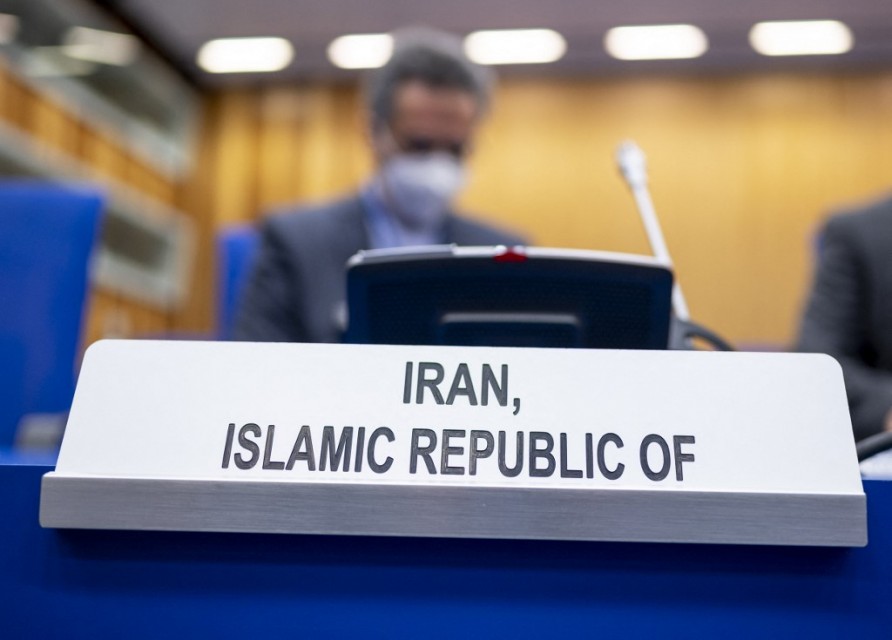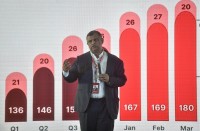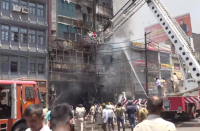
TEHRAN, Iran (AFP) — A revived Iranian nuclear deal must secure “equal rights” for all world powers involved, Russia said Monday, after Iran asked for details of Moscow’s demands for US guarantees on restoring the accord.
Russian Foreign Minister Sergei Lavrov said Saturday that, before backing the Iran nuclear deal, Moscow wants written assurances from Washington that Western sanctions imposed on it over the Ukraine war will not affect its economic and military cooperation with Tehran.
The following day, US Secretary of State Antony Blinken said such demands were “irrelevant”. Sanctions on Russia over its invasion of Ukraine “have nothing to do with the Iran nuclear deal”, he stressed.
The Russian demands have cast doubts on whether negotiations in Vienna which have reached critical stages, could be concluded swiftly.
Moscow is a direct party — along with Britain, China, France and Germany — to the ongoing talks aimed at reviving the 2015 nuclear deal. Washington is participating indirectly.
Iran made clear Monday it was seeking clarifications from Moscow, with foreign ministry spokesman Saeed Khatibzadeh saying “details” were needed.
“Iran’s peaceful nuclear cooperation should not be affected or restricted by any sanctions, including Iran’s peaceful nuclear cooperation with Russia” and other countries, he said.
Hours later Russia’s embassy in Tehran tweeted that Lavrov and Iranian Foreign Minister Hossein Amir-Abdollahian spoke by phone.
During the call, “it was emphasised that the resuscitation of the JCPOA should ensure that all its participants have equal rights regarding the unhindered development of cooperation in all areas”, the embassy said using the acronym of the 2015 nuclear deal.
Amir-Abdollahian said for his part that Iran’s cooperation with any country “including Russia, should not be affected by the atmosphere of sanctions”, the Iranian foreign ministry said.
Iran’s chief negotiator Ali Bagheri was returning home “briefly” Monday evening for consultations, state news agency IRNA reported.
Outstanding issues
The 2015 deal formally known as the Joint Comprehensive Plan of Action gave Iran sanctions relief in exchange for curbs on its atomic programme to guarantee that Tehran could not develop a nuclear weapon — something it has staunchly denied.
But the US unilateral withdrawal from the accord in 2018 under then-president Donald Trump and the reimposition of biting economic sanctions prompted Iran to begin rolling back on its own commitments.
The United States and other Western nations have imposed unprecedented sanctions on Russia following its invasion of Ukraine.
Parties to negotiations to revive the 2015 deal have signalled progress in the talks during the past several weeks.
Tehran has said that most of the draft agreement was approved, but outstanding issues depend on the West’s decisions.
“The remaining differences are less than the number of fingers on one hand if no one adds a new issue,” Khatibzadeh said on Monday.
“All of those (differences) await the response of the United States,” he added.
‘Unclear’ prospect
Iran’s top security official Ali Shamkhani on Monday also blamed the US for the lack of an agreement so far.
The “prospect of a deal in Vienna talks remains unclear due to Washington’s delay in making political decisions”, Shamkhani tweeted.
Tehran has been seeking a lifting of sanctions as well as guarantees that Washington would not again withdraw from the agreement.
As with the original agreement, Moscow is expected to play a key role in the implementation of any fresh deal with Tehran, for example by receiving shipments of enriched uranium from Iran.
“Russia’s approach so far has been a constructive one in order to reach a collective agreement in Vienna,” Khatibzadeh stressed.
The Vienna talks, which started 11 months ago, aim to return the US to the nuclear agreement, including through the lifting of sanctions on Iran, and to ensure Tehran’s full compliance with its commitments.
With the nuclear talks continuing in Vienna, Iranian and American officials have signalled that the two sides are indirectly discussing a possible exchange of prisoners.
Those negotiations have made “some progress”, Khatibzadeh said Monday.
“If this time, the US side honours its commitments and doesn’t retreat on the night of the implementation, I think we can close one of the important files in the humanitarian field.”
The US envoy for Iran, Robert Malley, had said it is unlikely that Washington would strike an agreement unless Tehran releases four US citizens.
The two sides have made prisoner swaps in the past and are currently known to hold four nationals of each other.
© Agence France-Presse







